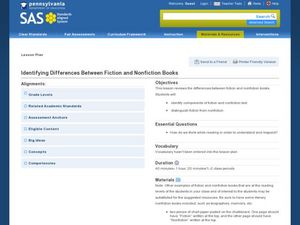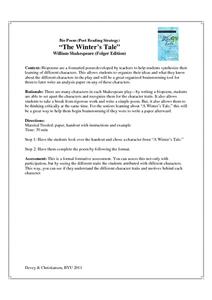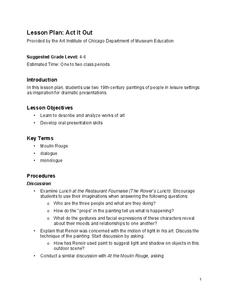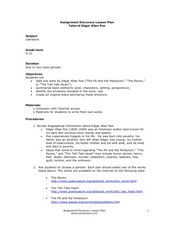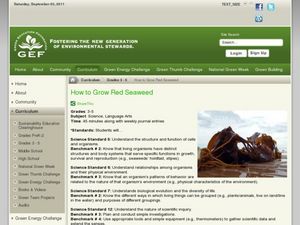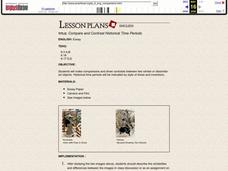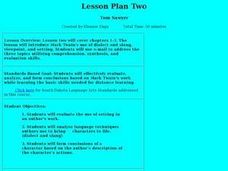Curated OER
The Greatest Survival Story of All Time
Students use the Internet to read about an explorer's survival in the Antarctic. They try to find a better route for him to have taken.
Curated OER
Identifying Differences Between Fiction and Nonfiction Books
Learners explore the differences between fiction and non-fiction book. In this genre study activity, students read examples of fiction and non-fiction and identify the characteristics of each genre. Learners list the characteristics on a...
Curated OER
Summarizing Key Information
Imagine the surprise when small groups present their Evidence Charts to the class and discover that each group has studied a different version of the Cinderella story. Irish, Ojibwa, Egyptian, Chinese, Korean, Persian, Mexican, and...
Novelinks
The Winter’s Tale: Bio Poem
Readers of Shakespeare's The Winter's Tale demonstrate their understanding of the play by selecting a character and crafting a bio poem that reveals his or her fears and aspirations.
Art Institute of Chicago
Act It Out
Examine two works of art and use these pieces as inspiration for dialogues. The whole class discusses Renoir's Lunch at the Restaurant Fournaise and Toulouse-Lautrec's At the Moulin Rouge. Then, in groups of either three or ten, pupils...
Curated OER
Compare and Chart the Stories
Elementary schoolers engage in a literature study. They make comparisons of two different versions of a story using a graphic organizer. Using the text and pictures elementary schoolers investigate three elements from the story. Then,...
Curated OER
The Outsiders Journal Guide for Chapter Six
In this novel guide learning exercise, students respond to eleven short answer questions about the plot and literary elements of Chapter Six in The Outsiders.
Curated OER
Author's Day
Have your learners choose an author to study. One resource link gives a list of approved authors. Scholars read at least three works produced by that author and produce three separate book reports as well as a two-page author report....
Curated OER
Fairy Tales Unit Ideas
Learners listen to children's fairy tales and watch them on a video. Afterward, they list the heroes from each story. Students write a short paragraph about a typical day for the hero. Learners dress up like their character and give a...
Curated OER
Tales of Edgar Allen Poe
Analyze the writing of Edgar Allen Poe by reading and then writing in a similar style. Budding authors learn about the life of Poe and read one or more of his famous works online. Partner groups create an original piece of writing using...
Curated OER
Focus on Figurative Language
Using the poems "First Snow" by Ted Kooser and "Eating Alone" by Yi-Young Lee (or other suggested poems by Robert Frost or Sara Teasdale), middle schoolers search for examples of figurative language. Guide your learners by discussing...
Curated OER
The Pearl Quiz
Do your readers remember Steinbeck's The Pearl? Check with this quick multiple-choice quiz. One question does not seem to have an accurate answer, so take the quiz yourself before giving to your class and check the answers.
Curated OER
The Outsiders: Chapter 1
In this The Outsiders comprehension check worksheet, young scholars respond to 20 short answer questions covering chapter 1 of The Outsiders by S.E. Hinton in order to help them better understand the novel.
Curated OER
On the Scene: Analyzing Scenes in Film and Literature
Students examine how a scene in a movie or in literature is constructed. In this film and literature lesson students answer questions based on film clips then create storyboards depicting a scene from their life.
Curated OER
"Knot" the Whole Truth: Writing a Modern-Day Story with a Tall Tale's Voice
Beyond Paul Bunyan and his blue ox, tall tales can be a great way to teach young writers about word choice and voice in their writing. Using Jerry Spinelli's Maniac Magee and the Six-Trait Writing process, they begin to write their own...
Curated OER
Bud, Not Buddy: Anticipation Guide
Hoover flags? Hoover blankets? Hoovervilles? Drawing upon prior knowledge of the Great Depression class members respond to the prompts on an anticipation guide for Bud, Not Buddy, Christopher Paul Curtis’s tale of Bud Caldwell’s quest to...
Curated OER
How To Grow Red Seaweed
Learners explore ocean biology by participating in a plant growing activity. In this seaweed lesson, students identify the importance and uses of seaweed in the ocean and examine different seaweed samples. Learners utilize an aquarium,...
Curated OER
Compare and Contrast Historical Time Periods
What do images tell us about history? Dress, setting, and actions all convey cultural norms, and in essence, give reference to historical time and place. Learners compare and contrast Kunisada's Actor with Flute in Snow to Hokuei's...
Curated OER
Author's Purpose
Sixth graders brainstorm the reasons authors write, and they list their responses on the board. Students discuss each purpose they have listed.Students work independently to read the selection "Tarantulas and Typhoid" by Stephanie Moss....
Curated OER
Tom Sawyer
This lesson kicks off with a PowerPoint presentation on Mark Twain. Learners examine the dialect, slang, viewpoint and setting. Then use e-mail to address three topics utilizing comprehension, synthesis, and evaluation skills.
Curated OER
Mosetsana
Students read and discuss a poem about the issues of gender, education, and family written by a Peace Corps Volunteer serving in South Africa. In this poetry lesson, students read the poem 'Moetsana' and discuss the issues South Africa...
Curated OER
Rename Fruits, Vegetables and Spices
Students explore fruits and vegetables. In this fruits and vegetables lesson plan, students study traits of various fruits, vegetables and seeds. Students rename fruits, vegetables and seeds.
Curated OER
Make a Windmill
Students explore Earth science by conducting an energy experiment in class. In this windmill lesson, students identify how wind has been used to pump water throughout history and the latest developments wind energy has produced. Students...
Curated OER
Come To Your Senses
Write narratives that include ideas, observations, or memories of an event or experience, and be sure to use concrete sensory details! Groups utilize a few of the famous I Spy books in order to create narratives that utilize sensory...



